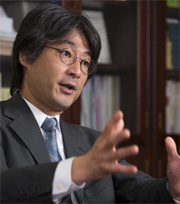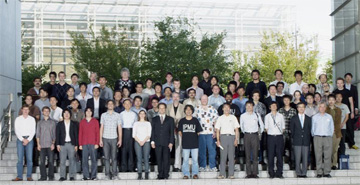Home > Highlighting JAPAN > Highlighting Japan JULY 2012 > Dark Matter and the Meeting of Minds
Highlighting JAPAN
COVER STORY: Nurturing Global Talent
Dark Matter and the Meeting of Minds

Kavli IPMU Director Dr. Hitoshi Murayama
Credit: MASATOSHI SAKAMOTO
"When conducting research, we inevitably run into a dead end. So when this happens, oftentimes, speaking with others or listening to their views helps to push my research a step forward," says Kavli IPMU Director Dr. Hitoshi Murayama. "We would like this teatime to be a place where this type of breakthrough occurs."
Kavli IPMU, which is a part of the World Premier International Center Initiative of the Ministry of Education, Culture, Sports, Science and Technology, was established in 2007 as a research institute where experts in the fields of mathematics, physics and astronomy gather with an aim to solving the mysteries of the universe, such as the genesis and the future of the universe and the materials that make up the universe. While many experts in different fields of discipline, such as in mathematics, physics and astronomy, do conduct joint research on the universe around the world, it is rare for researchers to gather in one research laboratory to conduct their studies.
One of Kavli IPMU's major research themes is dark matter. For example, the range of expanse of dark matter was a mystery, but in February of this year, Kavli IPMU researchers published a research result that dark matter is distributed throughout the entire universe.
Kavli IPMU has been addressing the mysteries of dark matter by utilizing facilities such as the Subaru Telescope site on the island of Hawaii and the XMASS experiment facility in Gifu Prefecture, central Japan.
Leading researchers from Japan and around the world have gathered at Kavli IPMU, with thirty-eight researchers from abroad out of the total of sixty-nine full-time researchers. Dr. Murayama also has been conducting research on the theory of elementary particles in the United States since 1993. He concurrently serves as a professor at the Department of Physics at the University of California, Berkeley, and frequently travels back and forth between Japan and the United States.
One of the director's major roles is to gather talented researchers. In order to achieve this, Dr. Murayama has invited researchers to Kavli IPMU by directly contacting various researchers from around the world or through introduction by his acquaintances. He is also active with its publicity push in the mass media in Japan and overseas as well as within academic circles.
Kavli IPMU is also placing its efforts on supporting foreign people who live in Japan. For example, the Kavli IPMU website has detailed information on medical treatments and children's education in English. The institute has also deployed staff that provide support in preparing the necessities for life in Japan, such as opening bank accounts, getting a mobile phone and searching for a home.
"To date, many foreign researchers have been uneasy about living in Japan, where the culture and the language is distinctive, and have been concerned about whether they could achieve results while conducting research in Japan. We focused on eliminating such concerns and gaining the trust of the researchers," Dr. Murayama says. "Five years have passed since its establishment, and fortunately, we've produced numerous research results. Researchers from overseas have started to tell us that their research at Kavli IPMU has led to advancements in their career."

Some thirty-eight of the sixty-nine full-time researchers at Kavli IPMU hail from overseas.
Credit: COURTESY OF KAVLI IPMU
"When Japanese people live only among themselves, we end up being self-contained, so we are unable to foster our ability to appeal to others. For example, it is important to gain this type of ability in a natural manner by creating an environment in which we are in contact with foreign people on a daily basis," says Dr. Murayama. "Japan's declining birthrate will continue further from here on. I believe that Japanese people and society must also globalize in order to sustain economic vitality."
© 2009 Cabinet Office, Government of Japan






